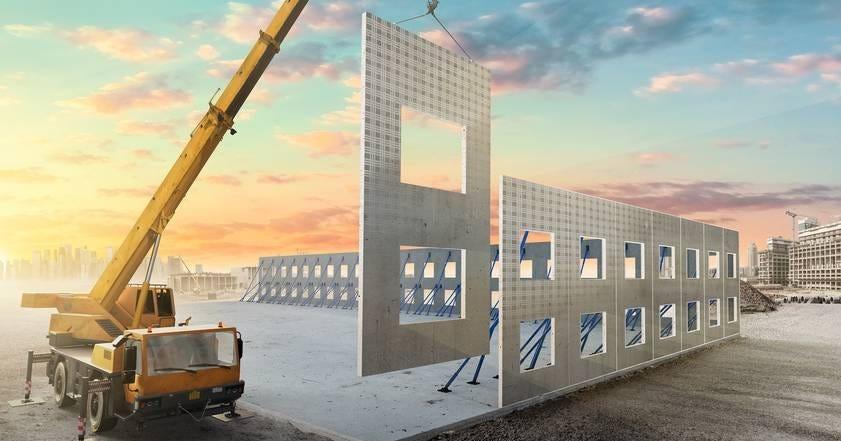Developers and builders in the commercial construction realm perpetually pursue efficiency. They actively seek methods to expedite project timelines and optimize resource utilization; among these strategies are modular wall panel systems–game changers of recent emergence. This innovative approach doesn’t simply promise swifter construction processes but also introduces heightened precision and cost-effectiveness, thereby instigating an industry shift towards a more efficient era.
Prefabrication’s Prowess
The concept of prefabrication forms the core of the efficiency revolution: traditional construction methods frequently require on-site assembly–a time-consuming process vulnerable to weather delays–of structural elements. Conversely, modular wall panel systems utilize an innovative strategy; they employ off-site manufacturing under controlled conditions for their panels. Not only does this strategy mitigate the influence of unfavorable weather conditions, but it also facilitates a systematic and streamlined manufacturing process.
Time is Money
Modular wall panels possess a primary advantage: they can notably truncate construction timelines. Their prefabricated nature facilitates the parallel processing of tasks; for instance, while on-site workers lay the foundation – craftsmen in manufacturing facilities simultaneously create these panels. Upon completion: swift transportation and assembly options become available to these ready-made panel structures–significantly reducing overall construction time. The efficiency of time not only accelerates project completion for developers, but it also manifests as cost savings: a translation that aligns with the adage–“Time is money.”
Precision in Construction
Modular wall panel systems embody the hallmark of precision. Unlike in traditional construction, where discrepancies can arise from on-site variables, craftsmen fabricate prefabricated panels with meticulous accuracy. Consequently, this level of exactitude ensures a snug fit during assembly and guarantees seamless integration between each subsequent panel. Not only does this precision enhance the building’s structural integrity, but it also reduces on-site adjustments necessity and minimizes errors and rework likelihood.
Versatility in Design
Not only do modular wall panel systems emphasize efficiency, but they also present a broad array of design possibilities. Developers possess the freedom to select from an extensive variety of panel types, materials and finishes, such as IMP walls, that correspond with their project’s aesthetic and functional prerequisites. The versatility in design here doesn’t just bolster efficiency; instead, it amplifies the adaptability—enabling modular systems to cater effectively to various architectural visions.
Resource Optimization
Efficiency extends beyond mere velocity: it involves resource optimization. Consider the significant contribution of modular wall panels to this facet; they minimize material wastage. Furthermore, in a controlled manufacturing environment–one that permits precise measurement and cuts–the result is a reduction in excess materials often destined for construction site waste disposal. This eco-friendly approach aligns with the growing emphasis on sustainable construction practices.
Cost-Effective Construction
Modular wall panel systems embody streamlined processes and resource optimization, resulting in direct cost savings. A more economical construction process emerges from reduced labor requirements, minimized material wastage, and accelerated project completion. This enhanced cost-effectiveness benefits not only developers but also bolsters the feasibility of ambitious commercial projects previously constrained by budgetary considerations.
Overcoming Challenges
Modular wall panel systems indeed promise efficiency; however, their successful implementation requires integrated project management: the manufacturing facility and on-site construction teams must coordinate meticulously. The coordination between these entities is paramount–transportation logistics pose a significant challenge, as does ensuring seamless assembly. To tackle such issues effectively: a holistic approach to project management becomes imperative. As we advance into an era where technological innovation takes precedence, the integration of Building Information Modeling (BIM) technology proves increasingly vital: it allows us to visualize and plan–in a cohesive manner–the entire construction process.
Conclusively, commercial construction undergoes a paradigm shift with the adoption of modular wall panel systems. These systems offer manifold benefits: they accelerate project timelines; ensure precision in fit – addressing potential issues early on, thus saving time and costs; optimize resources effectively leading to cost-effective construction. The industry’s evolution continues unabatedly – these innovative advancements not only maximize efficiency presently but also pave the way towards faster, smarter future constructions. Time and cost imperatives, along with a desire for sustainable and versatile design—these factors position modular wall panel systems as more than just components; they are indeed cornerstones in building impactful yet efficient commercial spaces.

